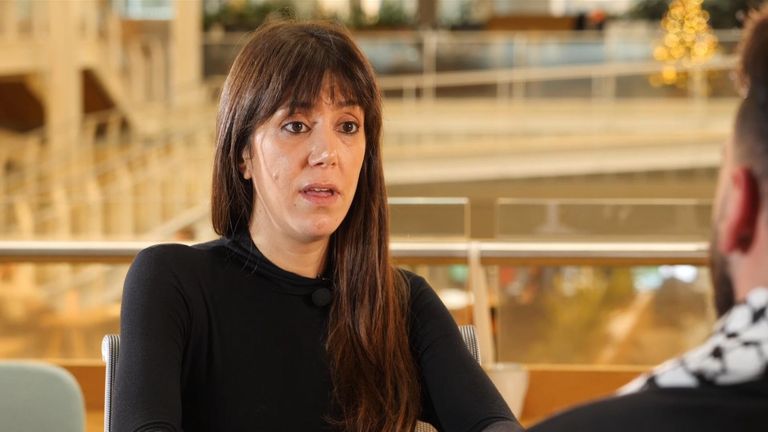We decided to bring together a British Jew and a British Palestinian who have felt themselves deeply affected by conflict in the Middle East.
Mohamed Aboukhachab is an accountant in his early 20s. He is a Muslim whose family came to Britain, via Lebanon, from the Palestinian “nakba” in 1948.
Deborah Lyons, 37, lives in north London and works in the fashion industry. She is Jewish and was born and raised in the UK.
Like Mohamed her family has suffered in the long conflict – her grandfather was killed by a bomb in Israel.
Follow live: Israel-Gaza latest
We know their interaction has no relevance to the war itself, but it does have relevance here in Britain: the distant thunder of the guns is creating divisions here, stripped of complexity, which it’s in all our interests to explore.
“I’m here to talk to you about ways in which, hopefully, at least, you and me, can come together to talk about how we can make things better – rather than things that push us further apart,” says Deborah.
“I agree,” says Mohamed, adding: “I want to display that there is a generation, and generations, of Palestinian people who can genuinely live in peace.”
It is not the narrative that we have most commonly seen in the news media since 7 October, when Hamas invaded southern Israel, murdering, raping and kidnapping its citizens.
But Deborah and Mohamed have agreed to come to Sky News and talk about their different perspectives and to see if they can find some common ground.
Since the October attacks and Israel’s retaliatory action on Gaza, there has been a rise in Islamophobic offences of 140% while antisemitic offences have risen by 1,353%, according to the Metropolitan Police.
Deborah thinks the recent pro-Palestinian marches, which have seen hundreds of thousands of people demonstrating on Britain’s streets, are a reason for this recent sharp rise in reports of antisemitism.
She has particular concern about the chant “from the river to sea, Palestine will be free,” a chant which Mohamed freely admits that he uses.
The chant refers to the Jordan River and the Mediterranean Sea, an area which contains all the Palestinian and Israeli territory.
It was first used in 1948, calling for a free Palestinian state for both Palestinians and Jews.
For some, it is a call to end the Israeli occupation of the West Bank, but to others, including many Jewish groups, it is an antisemitic slogan.
“Calling ‘from the river to the sea’ rather than calling for a two-state solution? That, for me, is truly problematic,” Deborah says.
“And then when I’m walking around London, seeing swastikas all over the street or ripped down hostage posters. Does it make me feel very targeted here? Very isolated and afraid?
“Yeah, 100%.”
“I think it’s unfair to say that the Palestinian marches and the protests are all defined by swastikas,” Mohamed says.
Read more:
Israeli forces fire tear gas at West Bank crowds
Footage shows convoy transporting hostages through the Rafah crossing
Who are the first 13 Israeli hostages released by Hamas?
“I can’t speak about being Palestinian because when I speak about being Palestinian, when I go to a pro-Palestine march, you say I walk among people who are antisemitic. And it’s really unfair to put those connotations on someone who’s simply marching for the freedom of his people.”
He goes on to explain that, for him, “from the river to the sea”, is not an anti-Israeli or antisemitic slogan, simply a call for an end to what he describes as “occupation”.
“I believe in a two-state solution,” he says.
Deborah remains unconvinced by this defence, insisting “it causes more divisions, it causes more harms,” but neither can convince the other.
Their disagreement is amicable.
Mohamed then says: “As a Muslim, I’ve seen a lot of what’s happened to my community and how we’ve been marginalised.
“And (for) the Jewish community, I’ve seen a lot, and it’s been horrific. We have no problems between each other and that’s what we need to show… one people.”
“Let’s hope,” says Deborah.
“We can hope,” Mohamed replies.
Mohamed and Deborah parted on warm terms.
Friends would be overstating it, but they recognised a shared citizenship within each other which policymakers will need to build on, even as the horrors of this war continue.
Checkout latest world news below links :
World News || Latest News || U.S. News
The post British Palestinian and British Jew discuss how Israel-Gaza conflict affects them appeared first on WorldNewsEra.

